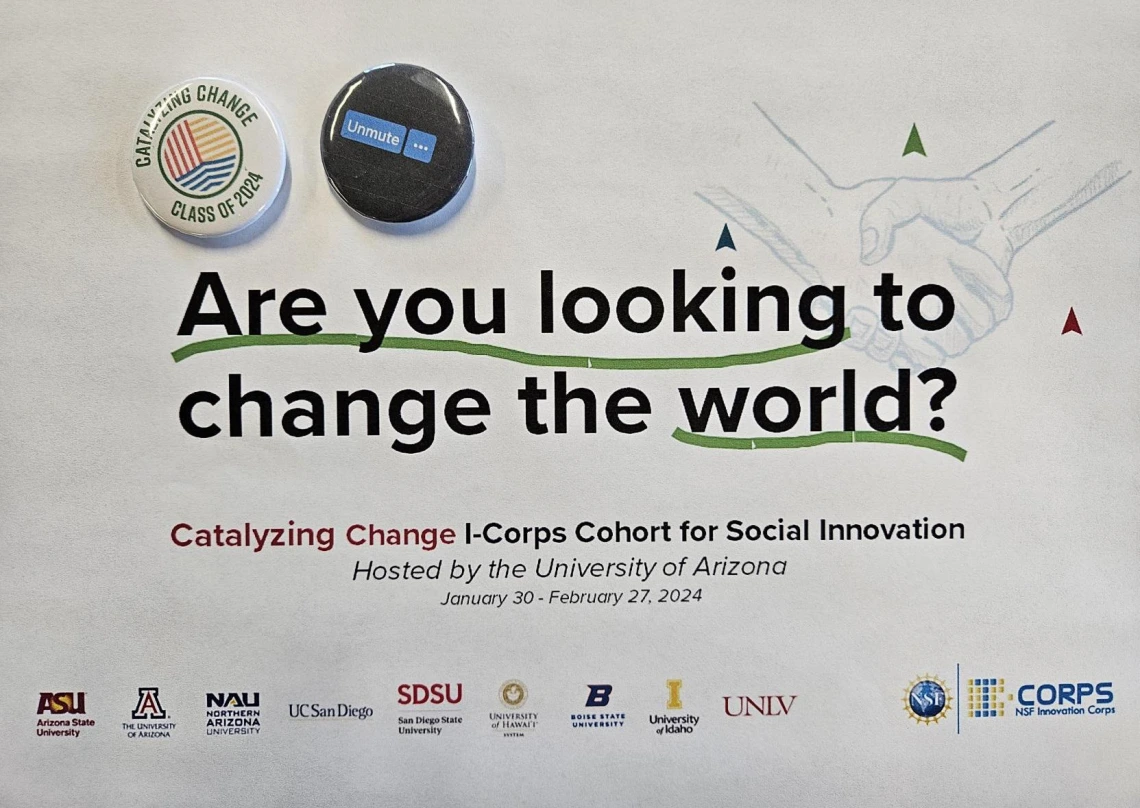Latest NSF I-Corps Cohort bridges the gap between social innovation and social impact

After the final session of the first Catalyzing Change I-Corps Cohort for Social Innovation, participant teams gathered to celebrate and network. Left to right: Becky Pallack, Aileen Dingus, and Renée Bidegain.
Kyle Kersey/Tech Launch Arizona
On February 27, the University of Arizona graduated its first Catalyzing Change I-Corps Cohort for Social Innovation. For this cohort, the program brought together 10 teams from three institutions in two states. I-Corps, an abbreviation for Innovation Corps, is a program funded by the National Science Foundation to provide inventors with the entrepreneurial skills to turn their discoveries into real-world solutions.
Tech Launch Arizona (TLA), the office of the university that works with campus inventors to commercialize the products of their work, administers the I-Corps program for the University of Arizona. The Social Innovation cohort is part of the broader Social Innovation program at TLA, which is all about amplifying the impact of university innovation in all its forms, enhancing community trust in pursuing impact pathways, and fostering positive change.
As part of the five-week program, I-Corps teams conducted a series of customer interviews to obtain valuable information about their innovations. Teams were given templates for approaching potential customers and taught how to conduct these interviews during their weekly classes, which were held over Zoom.
Becky Pallack, an adjunct professor in the School of Journalism and co-founder of Arizona Luminaria, a nonprofit community-focused online newspaper, said she joined this I-Corps cohort because she wanted to investigate methods for creating financially viable, free-to-read local reporting in a changing media landscape.
“It’s really important for local people to participate and be a part of their community,” Pallack said. “In a practical way, that’s going to mean testing some new ideas about how to sell advertising and learning more about my customers so I can bring them the right product at the right time at the right price.”
Renée Bidegain became involved in I-Corps as part of the University of Arizona Center for Innovation program. Bidegain and her business partner, Jocelyn Robertson, are developing a product called Kit Ship, which encourages in-person interactions using a traditional club structure.
Bidegain said that the customer interviews were the most valuable part of the I-Corps process for her team, which helped them determine who their customers would be if they bring their product to the marketplace.
“For the interview process, we had a lot of great help from the instructors on setting us up for success,” Bidegain said. “We were able to meet with them one-on-one to go over our questions. And I think that was invaluable because it gave us the confidence that we were asking the right questions to get the results we needed.”
Aileen Dingus, the Commercialization Network and Events Manager at Tech Launch Arizona, manages the I-Corps program and has had a hand in shepherding over 100 teams through the experience. She is an instructor for the Catalyzing Change I-Corps Cohort for Social Innovation and describes this process as the “scientific method for customer discovery.”
Dingus said she wants the University of Arizona to be a “thought leader” in social innovation. “I want other schools to look at the University of Arizona and say, ‘they’re doing it, how can we do it too?’”
Pallack said that she found the pace and accountability of the I-Corps program helpful.
“Aileen always provided weekly homework assignments and reminders so that we had to show up to the program having gotten a lot done from class to class,” Pallack said. “That was helpful because you want to show up and show that you’ve made progress rather than show up and be the one in the group who didn’t do their homework.”
Bidegain called the I-Corps program a “safe environment,” where inventors could test their ideas before going all in financially. Pallack said that she appreciated how supportive the teams were of one another and found learning from their experiences valuable.
“I learn a lot from other entrepreneurs’ journeys,” Pallack said. “What is this team’s obstacle and how did they overcome it? And then how can I apply that lesson to what I’m doing?”
Based on her I-Corps experience, Bidegain said that she encourages inventors and prospective entrepreneurs to join the program.
“I’ve had a lot of different jobs and I’ve started a lot of businesses in my life, and I’ve never gone through a program like this,” Bidegain said. “I think that for someone that’s seasoned, it’s really helpful. And for those who are unseasoned, I think it would be even more helpful.”
For more information on the NSF I-Corps program, visit the Tech Launch Arizona website or email Aileen Dingus at aileend@tla.arizona.edu.

The Catalyzing Change I-Corps Cohort for Social Innovation was open to teams from all 9 institutions that comprise the multi-state NSF I-Corps Hub: Desert and Pacific Region

